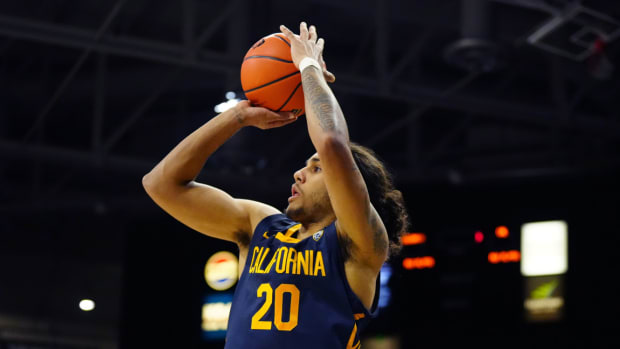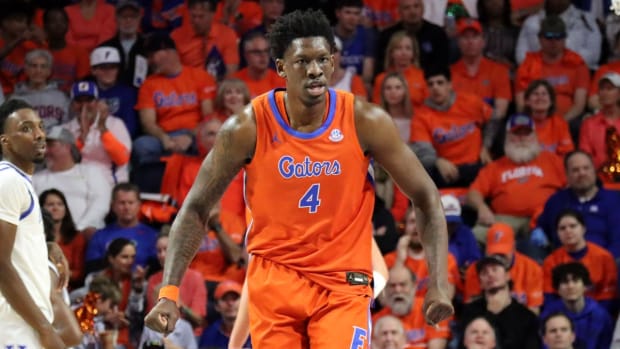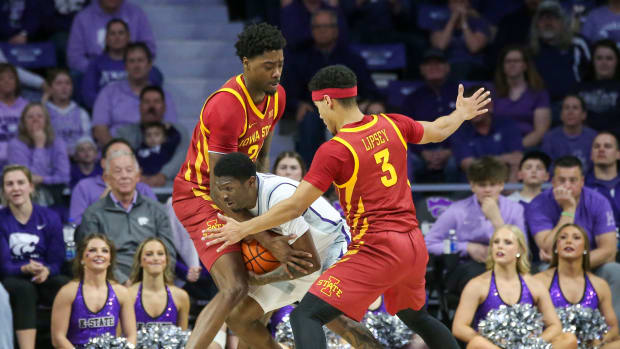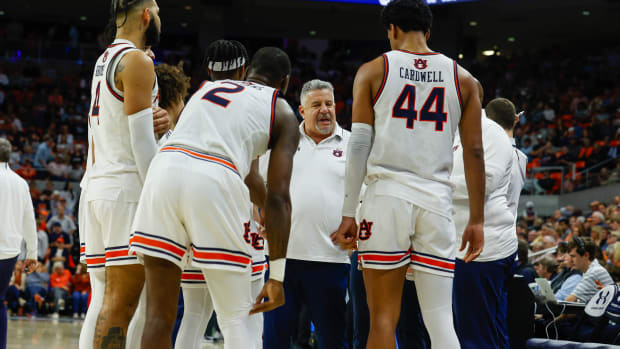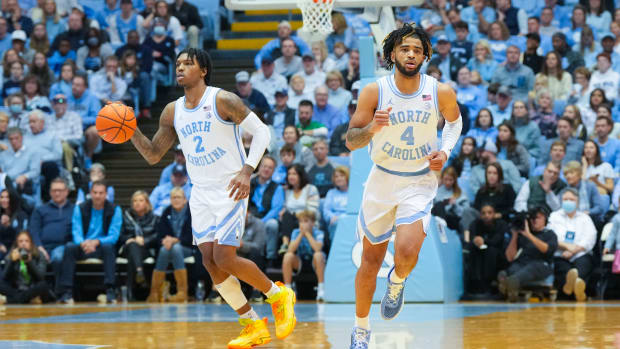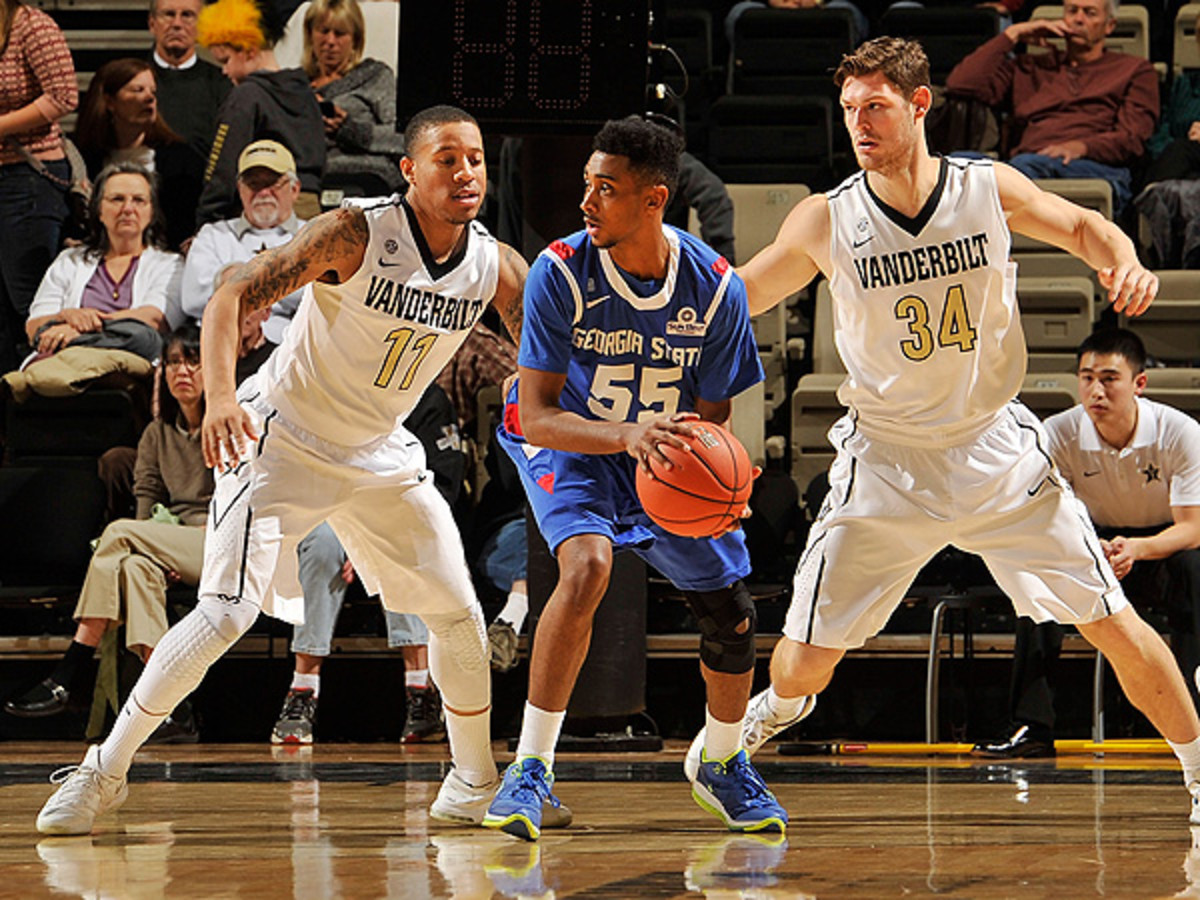
Near his father, Kentucky transfer Ryan Harrow finds peace, success at Georgia State
Ryan Harrow struggled to fit into Georgia State at first, but he's blossomed during its 14-game win streak. (Frederick Breedon/Getty)
Ryan Harrow was the last person in his family to learn his father had suffered a stroke. It was June of 2012. He was leaving a summertime workout at Kentucky when his phone rang and his mother delivered the news with a strong and even voice, assuring her son he should not worry. She had waited a couple days to assess the damage before calling. She told him everything was going to be OK. Still, a jolt of dread and uncertainty left Harrow without similar patience.
I’ll tell them I need to come home, he said.
Soon he was on a plane to Georgia, and then eventually on a plane back to Kentucky. He didn’t want to return to Kentucky but did so at his parents’ behest. So he played a year for one of the most scrutinized programs in college basketball with excruciating conversations clouding his mind. During the painstaking recovery from the stroke, Harrow’s father talked about the inability to get up by himself, to dress himself, to use the bathroom by himself. As a man, his father said, it was just hard.
“He would be really emotional, and I tried to be strong,” Harrow said this week. “But at the same time, it was wearing on me. I think almost every game, I played with pain. ‘What’s up with my Dad? Who knows what’s going to happen next?’”
Next came getting on a plane home and not going back, and after that came was a father and a son helping one another arrive at a better place. Harrow decided to leave Kentucky, to transfer to Georgia State to be closer to his Dad. Eleven months and one successful appeal for instant eligibility later, joy and clarity has followed in a 14-game win streak for the Panthers and the best season of Harrow’s turbulent college basketball career.
The Marietta, Ga., native averages 17.9 points and 4.5 assists for his third school in four seasons, after absorbing a storm surge of blame for the Wildcats’ dud of a 2012-13 campaign. He has found tranquility away from the bright lights and in the Sun Belt, which Georgia State, now 17-6 overall, leads with a 10-0 record. His father, Mark, has found happiness in eating lunches at Jamaican restaurants with his son, or screening movies together, or simply watching his boy play the game.
“They both helped each other out,” Georgia State coach Ron Hunter said. “Just the look in (Mark Harrow’s) face – he looks healthy now, compared to when I first saw him this summer. I want to applaud the NCAA – this is one that really helped both people. I think it saved both of them.”
That seems plain now but was not as clear when Harrow contemplated leaving Kentucky. He had designs on an NBA career, even after a rough sophomore campaign featuring 9.9 points per game, one tearful scene after a first-round SEC tournament loss to Vanderbilt and a benching in an NIT loss to Robert Morris. A glitzy recruiting class featuring the coveted Harrison twins actually served as incentive to stay; even if they played his position, Harrow figured the team would be equipped to win big.
But the thoughts about his father’s condition and how lonely he was in Georgia hounded Harrow all season. “That took a toll on me,” Harrow said. “The scare of him having a stroke, and me seeing him not being able to do the things he used to do – it almost makes me sad. I just figured I had to do something to help him. He’s always looked out for me my whole life. So I wanted to give back to him in some type of way.”
Calipari gave Harrow his blessing and his assurance that he would do what he could to ensure Harrow qualified for a waiver to play. The success of that appeal guaranteed Harrow would be both near his father and on the court immediately, a high-profile addition to a club already considered a preseason conference favorite. It did not guarantee satisfaction.
Harrow did not want to be the kid from Kentucky storming into the gym and laying claim to the team, so he spent most of his initial workouts asking questions and facilitating shots for everyone else. His play was so selfless that it approached pointless; Hunter approached Harrow at one point and told him, I didn’t bring you here just to pass the ball. Play your game.
His new coach sensed joylessness in the endeavor, too. Georgia State sometimes starts a workout by demanding each player makes a half-court shot. Or it will suddenly break into an improvised football formation – quarterback, center, receivers -- to run a play on the court. It is meant as a pressure release. The first time Harrow experienced it, he looked at Hunter like he was nuts.
“I bet out of the first month he was around me, he might have smiled twice,” Hunter said. “I would tease him – at the end of the day, it’s just basketball.”
A team-wide adjustment period bled well into the fall. Georgia State also infused former USC forward Curtis Washington into the lineup with Harrow. Holdovers R.J. Hunter – the coach’s son – and point guard Devonta White and swingman Manny Atkins modified their responsibilities. No one, Harrow included, seemed comfortable taking charge in their new roles. That led to uncomfortable results in a 3-6 start to the season. “It was horrible,” R.J. Hunter said. “We had all that hype and it felt like everybody just hopped off the bandwagon. But we knew we were going to get it going, man. We were way too talented not to.”
Georgia State reversed course by, well, reversing course. White returned to the primary ball-handler responsibilities he’d occupied for most of his career. Instead of helping initiate the offense, Harrow began playing mostly off the ball. That meant White sacrificed shot attempts, but the trickle-down was everyone sliding into familiar spots. R.J. Hunter (19.9 points per game) and Harrow became twin turbines on the offensive end, and the Panthers have won eight games in the current streak by double-digits.
“Once we got it down, the wins just started coming,” Harrow said.
The early season struggles stoked the familiar feeling for Harrow of playing under oppressive weight – “I didn’t want to come in here and mess anything up,” he said – but the midseason shakeup enabled him to shake that off. He has become self-assured enough to produce points and make a few. When Ron Hunter warned his team about the hostile environment at Louisiana-Lafayette, Harrow boosted confidence by saying it could not be anywhere as bad as a road crowd’s welcome for Kentucky.
Likewise, Ron Hunter believes his son has thrived because he has a better perspective on pressure – because R.J. Hunter has realized playing for your Dad doesn’t quite match the stress of playing for Big Blue Nation. “I saw the documentary they did on them, and (Calipari) was getting after him when the cameras were there,” R.J. Hunter said. “So I know it got bad when it the cameras weren’t around.”
R.J. Hunter meanwhile, believes Harrow has demanded a higher standard. Hunter had a slow start against Arkansas-Little Rock on Feb. 6, trying to feel out the game. Harrow chided his teammate early for not being ready to play. “He knows what buttons to push,” R.J. Hunter said. “I get mad at him, and when I get mad I’m trying to prove him wrong, so it makes me play better. He knows that.”
There’s no reason to be angry anywhere else, because there is too much to be happy about now. Mark Harrow’s health has improved drastically. He still walks with a limp, and he does not have full function with his left hand. But he attends every Georgia State game he can; last week, he was in he locker room, hugging his son and smiling.
Ryan Harrow otherwise sees his father two or three times a week. When his father met him downtown for a lunch, they usually went to Mango’s, the Jamaican joint where both ordered their mutual favorite: oxtails with rice, beans and plantains. When they got tired of that tradition, they settled on movie nights at Mark Harrow’s house.
“Me just being here with him makes him happy,” Ryan Harrow said. “I just wanted to do whatever I could to help him keep his spirits up.”
When Harrow left Kentucky, some fans appreciated his desire to be closer to his father. Others, he said, told him he was running from the Harrisons. But a player with so much on his mind had come to understand how to mute the noise. Harrow knew he could help his father get well. He had to go home. The rest of it he would figure out later.
It took longer than they’d hoped, but he and Georgia State accomplished that much. The outcome of the season might still be a referendum on Harrow and what he added to a team with sizeable aspirations in place. Fourteen wins in a row and counting, he’s happy to take that on.

